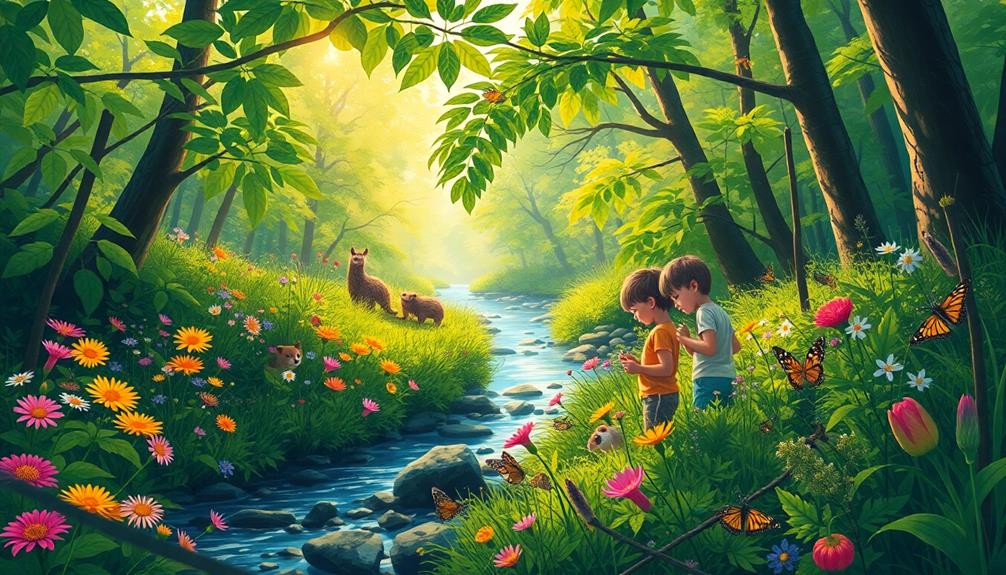Curiosity about the natural world ignites a deeper connection to the environment and boosts your environmental awareness. When you explore nature, whether through hiking, birdwatching, or just observing local wildlife, you engage with diverse ecosystems. This hands-on approach sparks learning about biodiversity while fostering critical thinking and problem-solving skills. Such experiences can also nurture a lifelong love for nature, inspiring you to advocate for conservation. Plus, practicing gratitude for your outdoor experiences strengthens your emotional connection. You'll discover how these interactions enrich your understanding and appreciation of the environment in ways that truly matter.
Key Takeaways
- Curiosity drives exploration in nature, leading to increased awareness of biodiversity and ecological systems.
- Engaging in activities like birdwatching or hiking stimulates questions, enhancing critical thinking about environmental issues.
- Curiosity fosters a lifelong love for nature, encouraging informed advocacy for conservation and sustainability.
- Hands-on experiences in nature cultivate respect and emotional connections, resulting in greater environmental stewardship.
- Encouraging curiosity in children builds foundational skills for responsible environmental citizenship and problem-solving.
Benefits of Nature Connection
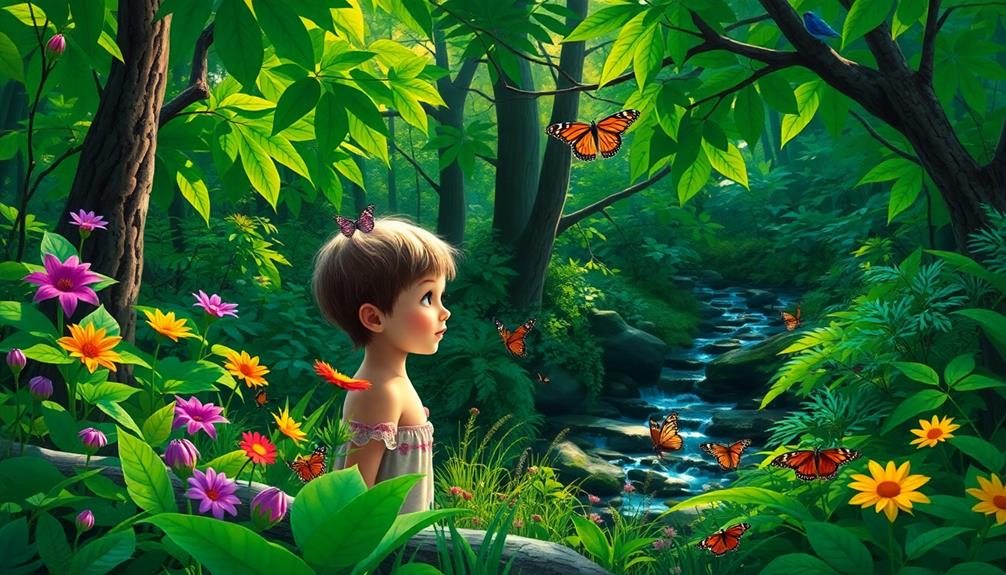
Connecting with nature offers you a wealth of benefits that can transform your mental and emotional wellbeing. By immersing yourself in natural environments, you'll discover a significant reduction in stress, anxiety, and depression. Outdoor activities like hiking or simply sitting in a park can lower cortisol levels while boosting serotonin production, enhancing your overall mental health.
Moreover, engaging with nature fosters mindfulness and presence, which are essential for developing resilience. Practices like forest bathing and Sit Spot encourage exploration, allowing you to find peace and calmness in your surroundings.
You'll also notice increased creativity and a sharper focus when you spend time outdoors. Attention Restoration Theory highlights how natural settings can rejuvenate your attention capacity, making it easier to tackle daily challenges.
Additionally, your appreciation of nature grows as you connect with your environment. This bond not only enhances personal well-being but also fosters community engagement and a deeper understanding of environmental awareness.
Ultimately, embracing these benefits of nature connection enriches your life, creating a sense of belonging and connectivity to the world around you.
The Role of Curiosity
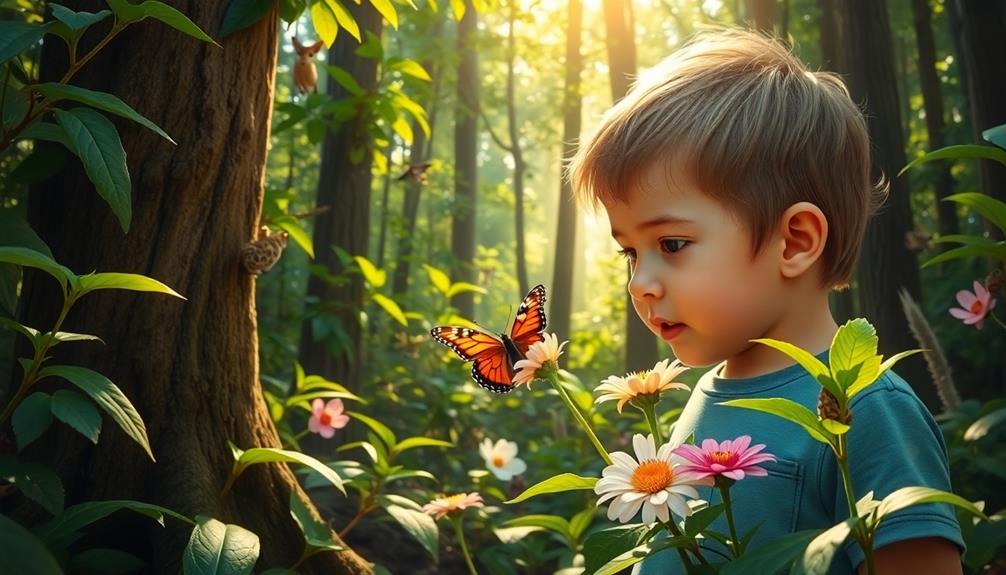
Curiosity acts as a powerful catalyst for exploring the natural world, deepening your understanding and appreciation of the rich biodiversity around you. When you engage with the natural environment, your curiosity about the world around you sparks learning opportunities that enhance your mental and emotional well-being.
Activities like hiking and birdwatching don't just offer enjoyment; they stimulate your inquisitive nature, releasing dopamine that promotes proactive attitudes toward environmental issues. This aligns with how astrology influences personality traits and can enhance self-image, which in turn fosters a greater connection to the environment.
As you explore nature, you develop critical thinking and problem-solving skills essential for addressing complex ecological challenges. This curiosity also nurtures a lifelong love of nature that encourages informed advocacy for conservation and sustainability. When you nurture your curiosity, you respect the environment more deeply, recognizing the interconnectedness of all living things.
Moreover, fostering curiosity in children builds foundational skills that will serve them throughout life. By encouraging their exploration of the natural world, you help them cultivate a sense of responsibility towards the environment.
Fundamentally, your curiosity enriches your experiences, allowing you to appreciate the beauty of biodiversity while becoming an informed steward of the planet.
Practices to Enhance Engagement
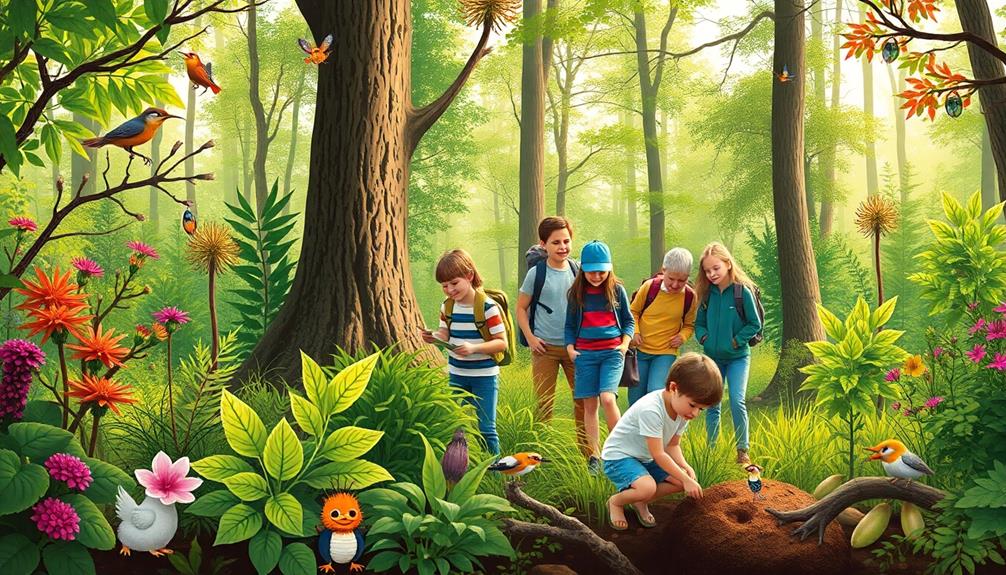
Engagement with nature can be greatly enhanced through a variety of intentional practices. Start by incorporating nature-based learning into your routine. Encourage children to explore their surroundings through hands-on activities, sparking their curiosity and fostering a deeper connection to the environment.
Organize community clean-ups or guided nature walks, which not only provide opportunities for physical activity but also promote social connections and collective stewardship of natural spaces.
Consider implementing gratitude practices focused on daily positive experiences linked to nature. This simple act can deepen emotional connections and enhance your overall sense of well-being.
You might also benefit from structured resources like the "Nature Connection Journal," which offers insights and practices for enhancing your engagement with the natural world.
Cultural Perspectives on Nature
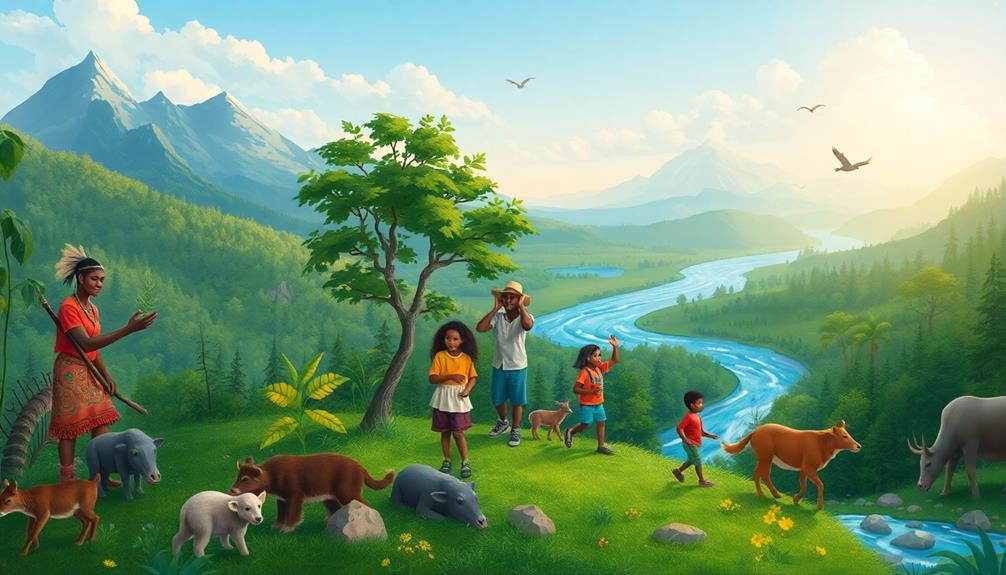
Cultural perspectives on nature reveal the diverse ways people relate to their environment, highlighting the significance of nature in shaping identities and values. You might find that many Indigenous cultures view natural phenomena, like the Northern Lights, as divine manifestations. This deepens their sense of connection and fosters a profound respect for the environment.
Similarly, Japan's practice of Shinrin-yoku, or "forest bathing," emphasizes immersing oneself in nature to enhance wellbeing, illustrating how cultural practices promote a harmonious relationship with the natural world.
Furthermore, global movements like Earth Day connect various cultures through shared ecological values and raise awareness about environmental conservation. Films such as Avatar use storytelling to highlight environmental issues, showing how cultural narratives can inspire action toward nature conservation.
These cultural practices reflect an intrinsic understanding of life's interconnectedness and advocate for stewardship as a crucial aspect of identity and heritage. By appreciating the complex beauty of the natural world through these cultural lenses, you can cultivate a lifelong love for nature and enhance your environmental awareness, recognizing the importance of protecting the planet for future generations.
Synergy Between Nature and Learning
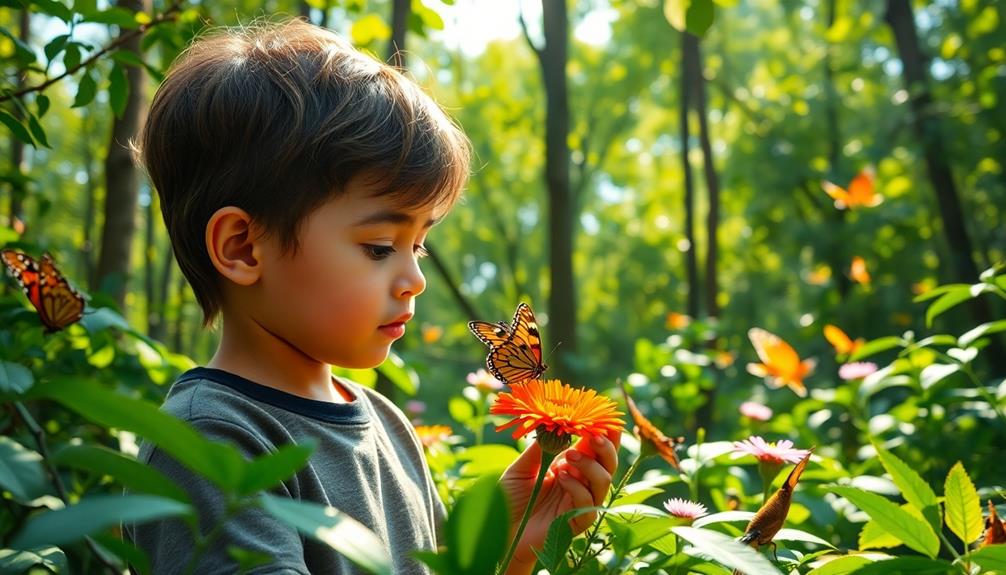
The connection between nature and learning is profound, as immersing yourself in the natural world can spark curiosity and ignite a passion for discovery. When you engage in physical activities like gardening or nature walks, you create opportunities to explore and develop a sense of wonder about the world around you.
These hands-on discovery experiences not only enhance your environmental awareness but also foster lifelong skills in critical thinking and problem-solving.
As children observe their surroundings, they cultivate natural curiosity that leads to deeper understanding and respect for living things. Nature-based learning promotes emotional well-being, allowing kids to develop resilience through unstructured outdoor play.
This connection to nature inspires creativity and imagination, as they witness the complexities of ecosystems first-hand.
Frequently Asked Questions
Why Is Natural Curiosity Important?
Natural curiosity's important because it drives your desire to explore and learn. When you're curious, you ask questions, seek answers, and make connections.
This not only enhances your understanding of the world around you but also fosters critical thinking and problem-solving skills. It encourages you to engage with new ideas and experiences, promoting lifelong learning.
Ultimately, your curiosity can lead to personal growth and a deeper appreciation for the complexities of life.
How Does Environment Affect Curiosity?
Ever tried to be curious in a dull, gray office? It's like expecting a cactus to bloom in a blizzard!
Your environment plays a huge role in sparking curiosity. When you step into vibrant parks or lush forests, your senses ignite. You can't help but explore!
The diversity of nature tickles your brain, making you ask questions and seek answers, while unstructured play turns you into a mini scientist ready to discover.
What Sparks Your Curiosity About the Natural World?
What sparks your curiosity about the natural world?
It could be the vibrant colors of blooming flowers or the intricate patterns on a butterfly's wings. You might find yourself fascinated by the sounds of birds singing or the rustle of leaves in the wind.
Each moment outdoors invites you to ask questions and discover answers, igniting a sense of wonder that deepens your connection to nature and enhances your appreciation for its beauty.
How Can Learning About Nature Be Useful?
Learning about nature's incredibly useful because it deepens your understanding of ecosystems and the interconnectedness of life.
By engaging with the environment, you sharpen critical thinking and problem-solving skills.
Outdoor activities like hiking and gardening foster a sense of curiosity, making science feel more accessible and exciting.
Plus, these experiences can enhance your mental well-being, reduce stress, and improve social skills, all while inspiring a lifelong commitment to protecting the planet.
Conclusion
Curiosity isn't just a spark for learning; it's an essential key to deepening your connection with nature. When you embrace your inquisitive side, you'll find that your awareness of environmental issues grows, leading to more meaningful engagement. Imagine this: the more you explore, the more you care. Could it be that your innate curiosity is the secret ingredient to fostering a healthier planet? Immerse yourself in the wonders of nature, and watch your perspective transform.
